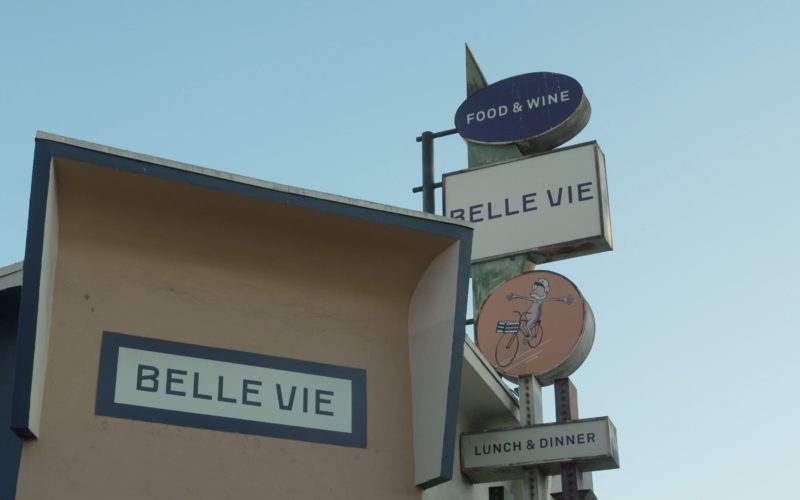Belle Vie (Mizelle, 2022)
As anyone who reads this blog knows, I am a documentary fan. Two of my absolute favorites in the genre (Shut Up and Sing!; The Queen of Versailles) are ones in which the documentarian is making a film and is fortuitously present when something unexpected happens and a larger, more interesting story than what was planned unfolds. In Barabara Kopple’s portrait of the Dixie Chicks, the earliest forms of cancel culture erupt when Natalie Maines makes a negative remark about then-President Bush, sparking conservatives to ban the band from the airwaves, burn the group’s CDs and, in one case, send a death threat to the singer. In Lauren Greenfield’s portrait of the uber-rich, a couple’s plan to build the largest single-family home in America is disrupted by the 2008 subprime mortgage collapse.
Such sudden turns make documentaries exciting. There is an adage in sports that says you can’t script tomorrow’s game. There are things that happen in real life that would seem awkward or unbelievable if presented in a scripted drama.
All of which is to say that Marcus Mizelle’s Belle Vie is very much my jam…or, it appears to be at first glance. Ultimately the film is satisfying and interesting, but it comes across as a tad too constructed to generate the excitement of the unscripted. Conversely, it does not quite have the level of introspection or analysis that is present in the best after-the-fact chronicles. (In the latter category, I’m thinking for example of My Kid Could Paint That, Hoop Dreams, or Free Solo.)
Of course 99.9% of the films ever made are not one of the half-dozen best examples of the genre, so what’s the point of such comparisons? Sometimes explaining the difference between “good” and “mediocre” is easier, but it isn’t always as instructive or revealing as thinking about what separates “good” from “best.”
Belle Vie is the name of a Los Angeles Bistro owned and operated by Vincent Samarco. (It is also an ironic comment on the restaurant business and how difficult it is, but more on that in a second.) Samarco is one of those high-energy, affable, passionate restauranteurs who momentarily appears to find the happy medium between Primo and Segundo in Big Night. In an early but important scene, Samarco talks about the building space where Belle Vie is located. It is in between two fast-food franchises and has housed multiple businesses that have aimed higher but found it harder to succeed without the stability of corporate money. The margins in food service are razor-thin, so intellectually we know that Samarco’s dream is a long shot, but for a moment he convinces us that passion and determination are enough to sustain life on the margins.
And then…Covid-19 hits. It’s a brutal stroke of bad luck, and the film is to be praised for putting a face on the abstractions of public policy. Samarco’s status as an immigrant is dependent on his work, and the documentary shows how even the most diligent workers can’t prepare for the blow that comes from unexpected quarters.
That is, of course, a depressing thought, one that runs counter to the myth of American exceptionalism. Is success absent a system of fail-safes and safety nets simply a matter of luck? Is hard work and determination sometimes not enough? Is “Belle Vie” a self-fulfilling prophecy about the pursuit of happiness being more important than its attainment? Or is it a painfully ironic commentary about how cultural myths are false narratives that distract us from the systemic imbalances that leave the American dream an easy grab for some and a near-impossible dream for others?
All of these thoughts are interesting, and the fact that the film is capable of evoking them speaks to Mizelle’s eye for detail and skill as an editor. (Documentaries often present contradictory editing challenges — not having enough material to put the narrative focus where one wants it or having so much material that it becomes harder to find the center amid a mass of interesting details.)
I do have a few knocks against the film, albeit slight ones. Mizelle confirmed in an e-mail discussion that the documentary began filming after COVID-19 restrictions were put in place. So while the first act is important and necessary context, it sometimes plays as deliberate foreshadowing and the second as an anticipated development rather than an unexpected one.
On a smaller note, Samarco’s frustration, however real, leads to some political expressions that border on incoherence. He rails against mask restrictions saying in effect that he doesn’t want a small-business loan but the freedom to serve his customers, all while claiming that good service is putting the customers first. Of course, these sorts of inconsistencies are what make real people in documentaries more interesting than politicians using the experiences of real people to advance some spin or talking point. Belle Vie is not a particularly editorial film, and that’s fine when the audience response (sympathy/empathy) is more or less a given, but as it develops, the refusal to editorialize can border on detachment.
Nitpicks aside, this is a solid documentary. As a postscript, I would add that it is also remarkably polished. I’ve seen documentaries at film festivals with exponentially more budget that don’t have as finished or fluid a look. None of the visuals are revolutionary, but there is enough of a mix between talking heads, real-time shots, stock photographs, etc, that the film never becomes visually static in the way that can derail some documentaries with bigger budgets and less understanding of how to shape and construct individual scenes. . One of these days, someone is gonna give Mizelle a small corporate budget and be pleased and surprised how much he is able to get out of it.

